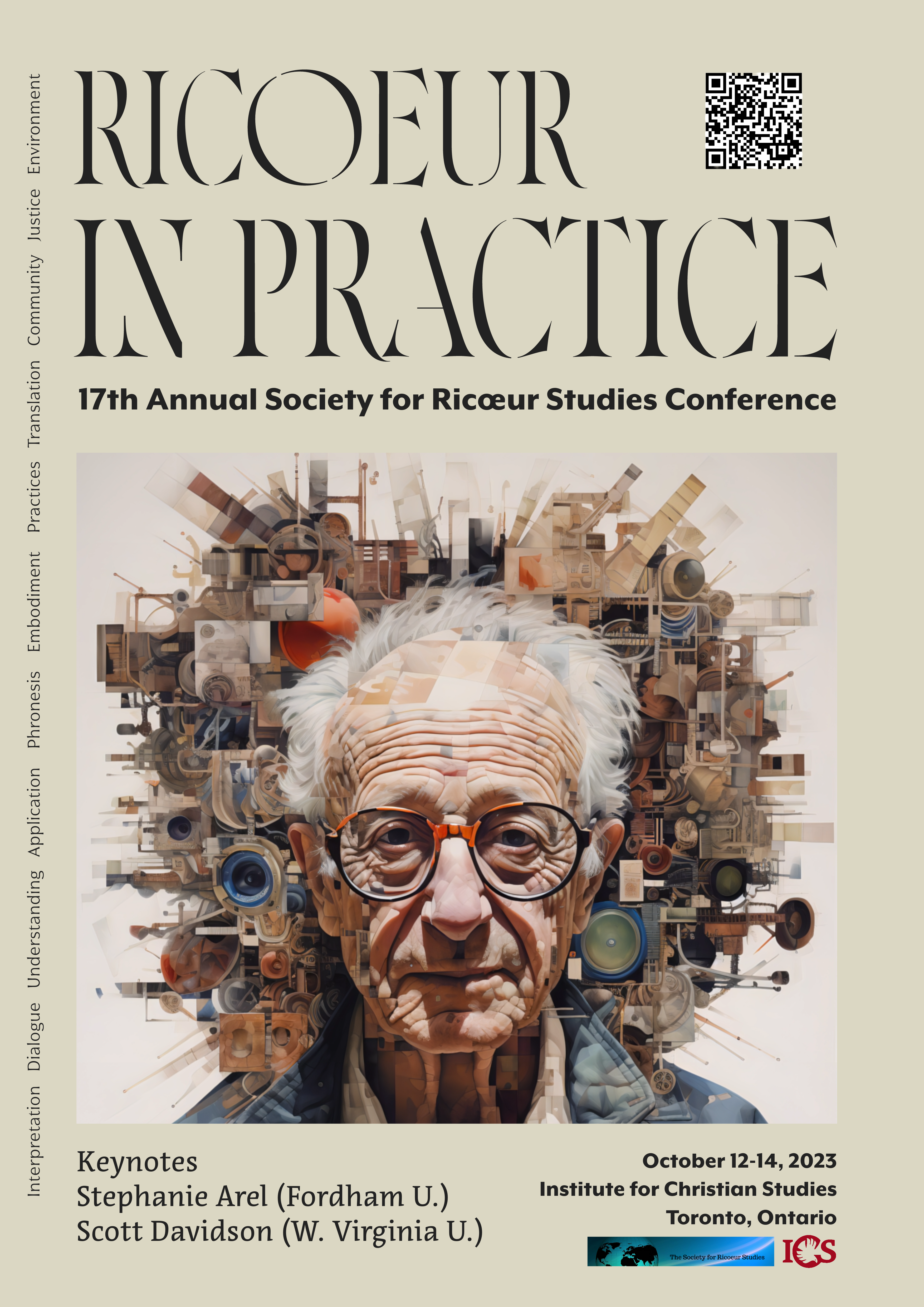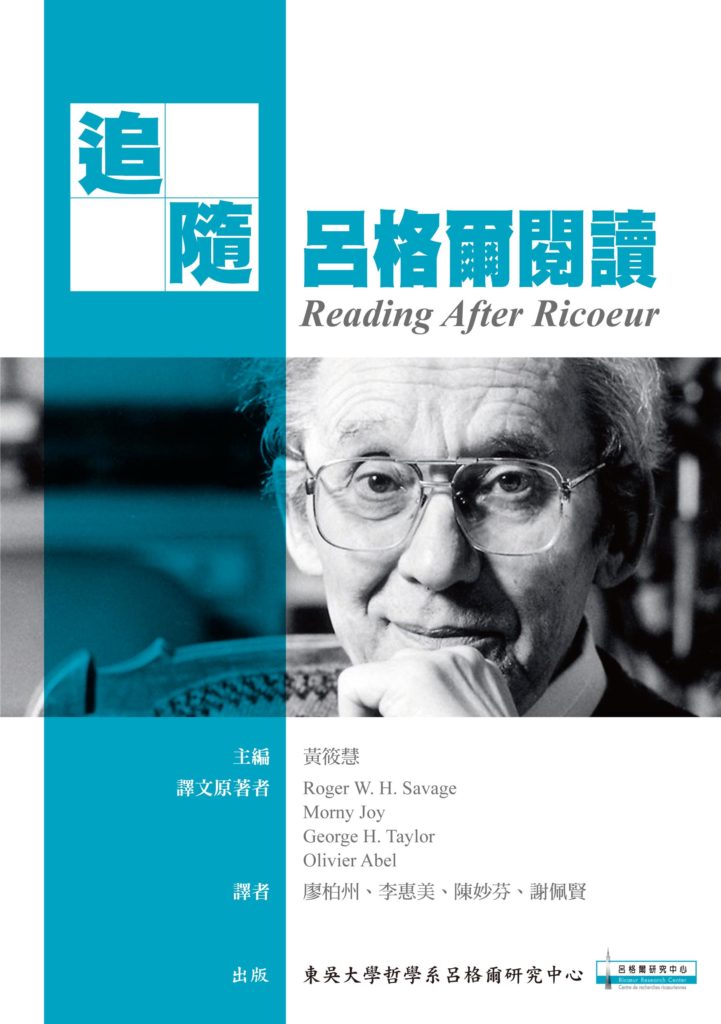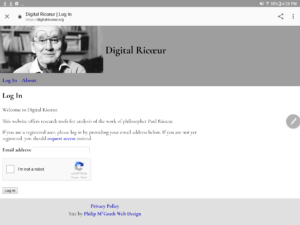Sep 04
Come to the 2023 SRS Annual Conference!
17th Annual Society for Ricoeur Studies Conference
“Ricoeur in Practice”
October 12-14, 2023
Institute for Christian Studies
59 St. George Street,
Toronto, Ontario
Program Schedule

Jul 21
Preliminary 2023 Conference program available!
17th Annual Society for Ricoeur Studies Conference
“Ricoeur in Practice”
October 12-14, 2023
Institute for Christian Studies
Program Schedule
Jun 29
Come to the 2022 SRS Conference!
16th ANNUAL SOCIETY FOR RICOEUR STUDIES CONFERENCE:
OCTOBER 20-22, 2022
Venue: Los Angeles, California
CSU, Dominguez Hills
Mar 05
2023 MLA Panel Paper Call
Please consider submitting a paper proposal for the following panel at the Modern Language Association conference to be held January 5-8, 2023 in San Francisco:
Ricoeur’s Interpretation Theory and Our Work Now
Paul Ricoeur insisted there is always more meaning than can be articulated, appropriated, or understood. This session seeks enactments, explorations, and reconsiderations of his Interpretation Theory 50 years later. Please send 250-word abstract and bio.
Deadline for submissions: Wednesday, 16 March 2022Nate Mickelson, New York U (mickelsonjn@gmail.com )
Jan 19
Call for Papers for the 2022 Fonds Ricoeur Summer Workshop
To apply for participation in the 2022 Summer Workshop, please submit an abstract on one the seven following topics:
• Defining hermeneutical phenomenology: Time and Narrative as an explanation
• Temporal experience in Time and Narrative 1 and 3: modalities of temporality from Aristotle to St. Augustine and from Kant to Husserl and Heidegger
• The theme of history in Time and Narrative 1 and 3 (and beyond): Ricœur’s epistemology of history and its reception
• Narrative and time in the maintenance of a Coherent Self, or The selfsame self and its narrative-temporal structures
• Ricœur’s theory of reading as an articulation of the rhetoric of reading, the phenomenology of reading, and the aesthetics of reception
• For what does Time and Narrative as a whole need its volume 2?
• Reconfiguration and Religion: Hermeneutizing the Uninterpretable
The Society for Ricœur Studies and The Fonds Ricœur have released a call for abstracts on the seven following topics (French only):
• La métaphore vive et Temps et Récit, deux ouvrages et une conception
• La cellule mélodique de Temps et récit I et son effectuation dans la trilogie : la triple mimèsis
• Débats avec la sémiotique et l’analyse littéraire
• Le Récit de fiction : « L’entrecroisement de la fiction et de l’histoire »
• La profondeur de l’expérience temporelle et les variations imaginatives à travers Virginia Woolf, Thomas Mann et Marcel Proust
• Qu’est-ce qu’une poétique du récit ?
• Renoncer à Hegel : histoire et aboutissement d’un thème fondateur
Instructions:
Please submit your abstracts (600- 1000 words) and your detailed bibliography by March 31, 2022 to atelierricoeur@gmail.com
Notification of acceptance will be sent out prior to April 15, 2022.
Important: Submissions can be provided in French or English – depending on the chosen subject area of investigation. Themes noted below in English will consider paper submissions in English only. Similarly, thematic areas noted in French will accept paper submissions in French only.
_______________________________
Nous sommes honorés d’annoncer un appel aux propositions pour notre cinquième édition des ateliers d’été consacrée à la Trilogie du Temps et récit.
Le Fonds Ricœur et la Society for Ricœur Studies font appel aux propositions pour les sept thèmes suivants:
• La métaphore vive et Temps et Récit, deux ouvrages et une conception
• La cellule mélodique de Temps et récit I et son effectuation dans la trilogie : la triple mimèsis
• Débats avec la sémiotique et l’analyse littéraire
• Le Récit de fiction : « L’entrecroisement de la fiction et de l’histoire »
• La profondeur de l’expérience temporelle et les variations imaginatives à travers Virginia Woolf, Thomas Mann et Marcel Proust
• Qu’est-ce qu’une poétique du récit ?
• Renoncer à Hegel : histoire et aboutissement d’un thème fondateur
Le Fonds Ricœur et la Society for Ricœur Studies font appel aux propositions pour les sept thèmes suivants (anglais uniquement):
• Defining hermeneutical phenomenology: Time and Narrative as an explanation
• Temporal experience in Time and Narrative 1 and 3: modalities of temporality from Aristotle to St. Augustine and from Kant to Husserl and Heidegger
• The theme of history in Time and Narrative 1 and 3 (and beyond): Ricœur’s epistemology of history and its reception
• Narrative and time in the maintenance of a Coherent Self, or, The selfsame self and its narrative-temporal structures
• Ricœur’s theory of reading as an articulation of the rhetoric of reading, the phenomenology of reading, and the aesthetics of reception
• For what does Time and Narrative as a whole need its volume 2?
• Reconfiguration and Religion: Hermeneutizing the Uninterpretable
Instructions : Envoi des propositions (600- 1000 mots) et de votre bibliographie détaillée avant le 31 mars 2022 à atelierricoeur@gmail.com
Vous recevrez une réponse avant le 15 avril 2022.
Important : Les propositions devront être faites en anglais ou en français en fonction de la langue du thème choisi. Pour les thèmes mentionnés en anglais, votre proposition de résumé doit être rédigée impérativement en anglais. Pour les thèmes mentionnés en français, votre proposition de résumé doit être rédigée impérativement en français.
Nov 05
Upcoming Conference
“Paul Ricoeur on Collective Identities”
University of Trier
Nov. 15-17
Please see “Conferences & Workshops” page
Oct 03
2021 RICOEUR (ONLINE) CONFERENCE : 7th-9th October
We are happy to announce that the 2021 Ricoeur conference will take place online from the 7th to the 9th of October. There is no conference fee this year; just the Society registration fee. Please visit here for instructions about how to join and register for the conference! We are happy to welcome you!
Apr 10
Reading After Ricoeur
Oct 07
Digital Ricoeur now on Website
The digitalricoeur.org link to many of Paul Ricoeur’s work is now on our website. Thank you, George, Fernando and Michael for making this project happen!


